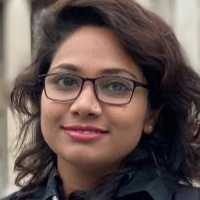International Journal of Engineering and Manufacturing (IJEM)
IJEM Vol. 11, No. 1, 8 Feb. 2021
Cover page and Table of Contents: PDF (size: 492KB)
Skin Lesion Detection Using Fuzzy Approach and Classification with CNN
Full Text (PDF, 492KB), PP.11-18
Views: 0 Downloads: 0
Author(s)
Index Terms
Dermoscopic image, fuzzy logic, segmentation, lesion detection
Abstract
Skin lesion detection at early stage is very effective for patients. As a result, patients can get time for treatment. Moreover, this early detection helps a patient in the long-time survival. However, skin lesion detection from a dermoscopic images is not a general task. Due to inter and intra-observer variations in human interpretations, research on skin lesion detection from dermoscopic images become important. In this paper, we proposed a method to segment and detect lesion of skin from images. The proposed method is based on a set of rules of fuzzy logic approach. Firstly, a set of rules is applied on dermoscopic images. The output is then thresholded. Closing operation as a morphological tool is used on the thresholded image. Then area filtering takes a place which results in the desired output. With respect to different learning models, CNN shows better performance in classifying ISIC and Dermis-dermquest dataset. The system delivers a significant performance, which is remarkable and comparable.
Cite This Paper
Prashengit Dhar, Sunanda Guha, " Skin Lesion Detection Using Fuzzy Approach and Classification with CNN ", International Journal of Engineering and Manufacturing (IJEM), Vol.11, No.1, pp. 11-18, 2021. DOI: 10.5815/ijem.2021.01.02
Reference
[1] Jemal A, Siegel R, Ward E, Hao Y, Xu J, Murray T, et al. Cancer statistics. A Cancer Journal for Clinicians 2008; 59:225–49. CA.
[2] Argenziano G, Soyer HP, De Giorgi V. Dermoscopy: a tutorial. EDRA Medical Publishing & New Media; 2002.
[3] Binder M, Schwarz M, Winkler A, Steiner A, Kaider A, Wolff K, et al. Microscopy:a useful tool for the diagnosis of pigmented skin lesions for formally trained dermatologists. Archives Of Dermatology 1995;131(3):286–91.
[4] Fleming MG, Steger C, Zhang J, Gao J, Cognetta AB, Pollak I, et al. Techniques for a structural analysis of dermatoscopic imagery. Computerized Medical Imaging and Graphics 1998.
[5] Celebi ME, Aslandogan YA, Stoecker WV, Iyatomi H, Oka H, Chen X. Unsupervised border detection in dermoscopy images. Skin Research and Technology 2007;13(4):454–62.
[6] Yang, X., Zeng, Z., Yeo, S.Y., Tan, C., Tey, H.L., Su, Y.: A novel multi-task deep learning model for skin lesion segmentation and classication. arXiv preprint arXiv:1703.01025 (2017)
[7] Vesal, S., Ravikumar, N., Maier, A.: Skinnet: A deep learning framework for skin lesion segmentation. (2018) preprint,
[8] Ronneberger, O., Fischer, P., Brox, T.: U-net: Convolutional networks for biomedical image segmentation. In Navab, N., Hornegger, J., Wells, W.M., Frangi, A.F.,eds.: Medical Image Computing and Computer-Assisted Intervention { MICCAI 2015, Cham, Springer International Publishing (2015) 234-241
[9] Ren, S., He, K., Girshick, R., Sun, J.: Faster r-cnn: Towards real-time object detection with region proposal networks. In: Advances in neural information processing systems. (2015) 91-99
[10] Carlotto MJ. Histogram analysis using a scale-space approach. IEEE Transaction on Pattern Analysis and Machine Intelligence 1987;1(9):121–9.
[11] Hance GA, Umbaugh SE, Moss RH, Stoecker WV. Unsupervised color image segmentation with application to skin tumor borders. IEEE Engineering in Medicine and Biology 1996;15(1):104–11.
[12] Dhawan AP, Sicsu A. Segmentation of images of skin lesions using color and texture information of surface pigmentation. Computerized Medical Imaging and Graphics 1992;16(3):163–77.
[13] Gao J, Zhang J, Fleming MG, Pollak I, Cognetta AB. Segmentation of dermatoscopic images by stabilized inverse diffusion equations. Proceedings of the IEEE International Conference Image Process 1998; 3:823–7.
[14] Schmid P. Segmentation of digitized dermoscopic images by two-dimensional color clustering. IEEE Transaction on Medical Imaging 1999; 18:164–71.
[15] LeCun Y, Bengio Y, Hinton G. Deep learning. Nature 2015 May 28;521(7553):436-444
[16] Brinker, Titus Josef, et al. "Skin cancer classification using convolutional neural networks: systematic review." Journal of medical Internet research 20.10 (2018): e11936.
[17] Abbas Hanon. Alasadi, Baidaa M.ALsafy,"Early Detection and Classification of Melanoma Skin Cancer", International Journal of Information Technology and Computer Science(IJITCS), vol.7, no.12, pp.67-74, 2015. DOI: 10.5815/ijitcs.2015.12.08
[18] https://www.dermis.net/dermisroot/en/home/index.htm
[19] https://uwaterloo.ca/vision-image-processing-lab/sites/ca.vision-image-processing-lab/files/uploads/files/skin_image_data_set-2.zip
[20] Xie F, Fan H, Li Y, Jiang Z, et al (2017). Melanoma classification on dermoscopy images using a neural network ensemble model. IEEE Trans Med Imaging, 36, 847-58.
[21] Yu Z, Ni D, Chen S, Qin J, et al (2017). Hybrid dermoscopy image classification framework based on deep convolutional neural network and fisher vector. IEEE 14th International Symposium on Biomedical Imaging, pp 301-4.
[22] https://www.kaggle.com/c/siim-isic-melanoma-classification/data

